

 |
 |
||||
| Home | Reviews | Extras | Forums |
|
Captain EarthSynopsisHaving once lost his father to invading forces, Daichi Manatsu joins the Globe Organization to fight the Kiltgang (or is that Kill T Gang?). There he meets some people he remembers from his childhood, and gets embroiled in a battle for Earth's survival. ReviewStig: I'm not normally one for rather obvious giant robo shows, but the concept of this one seemed too weird to pass up. And the promo image featuring the gorgeous Hana Mutou miiiight have played some part in easing that decision, I will somewhat shamefully admit. Tim: Like Stig, I too was suckered into Captain Earth by way of Hana. This dark-skinned beauty fooled both of us into thinking that perhaps underneath all the mecha action, there'd a cute little love story between her and Daichi. And in a way there was, but it takes so long to get there. 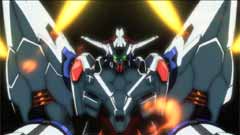 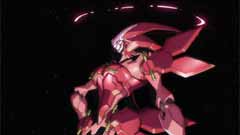 In a way, Captain Earth is almost the archetypical giant robot show, shonen showpiece, and sorta-cryptic space sci-fi all rolled into one. It's not a bad combination if you know how to use it, and for what it's worth, Captain Earth had a sort of cheesy appeal. At first. It's not that the show is hard to follow, but it tries (rather annoyingly, we might add) to hide this by applying heavy amounts of treknobabble to everything. Daichi flies the giant robot the "Earth Engine Impacter" - fair enough - but he also has the ability to summon a livlaster (a pistol of sorts) that uses Orgone energy to fire. The aliens, which crunchyroll hilariously subtitle as "Kiltgang" (bringing about mental images of a certain Monthy Python skit starring people turned into Scotsmen by blancmange-based alien lifeforms, which would have been no less ridiculous than this show), refer to the Earthlings as Neoteny, and they run these complicated attacks on Earth in order to take our libido energy. To do this, they run this first round attack, where they have to endure for a set number of minutes. If the Midsummer Knights (the name our heroes eventually start calling themselves) can't defeat them by that time, the enemy will be able to initiate an attack from their base in space, and send a Machine Goodfellow staffed by one of the Planetary Gears, seemingly immortal personalities that look human but have a tiny square core of unknown origin. So yes, they're immortal space cubes coming to steal our libido to feed on, and we have to fight them with our robots controlled by sci-fi guns called livlasters. Got that? Good. The first half of the show is centered around the other Planetary Gears members being identified and then turned. The show starts out with Amaroc and Moco, two Gears who have the ability to turn the dormant ones active with a kiss. Outside of Teppei, who is already aware of his alien-ness and later voluntarily destroys his own cube, the show turns into a bit of a predictable routine, where the Midsummer Knights fails to get to the other Gears in time, they are turned, and an attack is initiated. Routine as it is, it does at least allow us some time in the lives of a list of people, and their up-to-then lives. Baku, aka Bugbear, actually lived a life that could have been a separate OAV series all by itself, even if it's being sort of predictably tragic, which is actually a bit against the general tone of the show itself. Still, they are at least far more interesting than the main cast. Daichi is the archetypical shonen hero in a giant-shouldered mecha suit. His father died protecting the Earth, so of course, he has to pick up that torch. He also looks like an older version of Renton from Eureka Seven, a BONES series from nine years prior. Joining him are three other people. There's Teppei Arashi, the former Planetary Gear turned human, who has a deal with Daichi where they return a necklace of sorts every time they do something that impresses the other. He's also used early on to rather annoyingly serve as the series' drama/angst fuel, though thankfully he snaps out of that soon enough. Then there's Akari Yomatsuri, a character who's wasted on this show. She's easily the best member of the crew and arguably does more than the others put together. Granted, she comes across as a bit of a "movie hacker" at times, but she's energetic and to the point, and definitely has the series' greatest moment of awesome when she gets kidnapped by the enemy and almost literally browbeats them into releasing her instead of waiting for Daichi or Teppei to do it. In fact, Daichi's first battle against Moca only ends as a win for the "good guys" because Akari basically takes over the controls of the mecha Daichi launched himself into space with as if it was some kind of wireless marionette. ("Wireless". Get it? Huh? Huh?) Daichi and Teppei might be the ones who do most of the direct fighting, but they're no match for Akari. 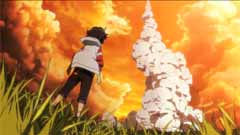 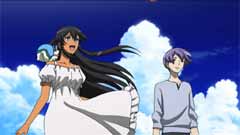 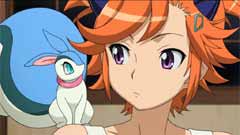 Rounding out the main cast is Hana, the pretty flower of the group. She's usually accompanied by a blue squirrel-thing called Pitz, and seems to have the ability to predict when the Kiltgang will attack. (Though she usually credits that to Pitz, too.) Her eye-catching beauty might have been the reason we started watching the show in the first place. As it went along, though, both of us grew increasingly irritated over how she seemed to get sidelined from the action, or reduced to the role of damsel in distress more often than not. Some episodes past the halfway point, the show ignited a ray of hope when she had her own awakening as a Midsummer Knight, complete with her own Livlaster, and for a while, she was finally allowed to be a contributing member and an equal. But, sadly, that was not to be. She started out as a trophy wife of sorts for Daichi and ended the show as one, as if her moment in the limelight was included just so people wouldn't say the show is sexist. And that's just sad. Don't get us started on the final episode and what they do to further damage her character. Our facepalms could probably have been heard from the moon. Captain Earth certainly has its terminology in order, but it has a mortal fear of anything that isn't shonen action. Outside of the overly complex ridiculousness of the Planetary Gears (and its business front, the Macbeth Enterprises), there's also a subplot centered around the Ark Faction that doesn't really go anywhere, outside of their introduction as a rival group who only want to save the rich and powerful, and their actions are mostly portrayed at first through an almost faceslappingly villainous asshole in glasses that want to control our protagonists with head-mounted contraptions that causes them pain if they go outside of the complex itself. It's completely forgotten about once the final big boss confrontation rolls around. And for all of the show's attempts at coming across as complex and business-like, it ends like many other shounen action shows; with a lot of yelling and fist-throwing, and Daichi having to save Hana once again. Said finale pretty much destroyed any hope of salvaging whatever appeal Captain Earth had left at that point. There's a very dumb plot twist involving the villains of the series, and for one episode, the show pulls a Neon Genesis Evangelion and, in a move that's actually becoming a bit of a cliché, shows us a world where Daichi never became a pilot, and spends his time casually hanging around the other villains of the series like it's just another day in their lives. They spend almost an entire episode on this, which feels more like a Big-Lipped Alligator Moment than anything else. At least Hana got to participate in the final battle, though not without her throwing in one last part as the damsel that needs to be saved. 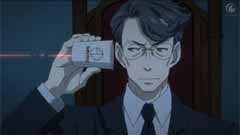 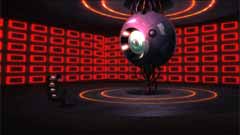 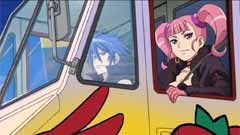 Stig: Christ, Captain Earth was a frustrating watch. For all its up-front attempts at complexity, the show itself is a looooong love letter to youth, much like many others before it and certainly many more in the future. While there's nothing outright wrong with that, Captain Earth is being oddly snotty about it in the way that adults with experience are limited to emotional support, being the butt of jokes or being evil. The fact that, for all its building and labeling, the ending amounts to so much screaming and wildly attacking that its own buildup flies out the window, and the final battle is won by the main lead just being able to overpower his opposition because. It's the laziest, most egotistical, and worst kind of shonen, and that the show would resort to this is disappointing. Hilariously enough, the way the show pronounces its own title makes it sound more like they're saying "Captain Ass", which at first earned itself a wry grin from my own department of juvenile delights, but now I'm more along the lines of "Yeah, that sounds about right." Tim: It never helped in my case that aside from Baku, I found most of the villains to be irritating stereotypes. Amara especially pissed me off, and it infuriated me that barely anyone ever called him out on his crap in the entire run of the series. Daichi's mecha setup takes an eternity to set up, and you're forced to watch it several times. The technobabble is annoying and serves little purpose. The animation in the final episodes is almost Toei levels of bad. But most of all, aside from Akari and her mother (and to a lesser extent Hana), I found myself not much caring for anyone by the time the show winded down, hero or villain-wise. Between its fill-in-the-blank shonen male lead, over usage of mecha and shonen cliches, crap villains, stupid-looking mecha, and its mistreatment of Hana to use her for whatever purpose the script desires (love interest/battery/Princess Peach/etc.), Captain Earth annoyed me far more than it entertained me. A second star for Akari and for the few moments Hana had the chance to shine. You were both wasted on this huge egomanical fantasy. — Stig Høgset and Tim Jones Recommended Audience: The violence is mostly explosions, though there is some of the more physical kind once Baku's backstory is visited, dealing with underground fighting and such. For fanservice, we have girls in swimsuits and one partially flirtatious idol with a sizable bustline she's not shy about showing off. Version(s) Viewed: Digital stream on Crunchyroll, Japanese with English subs. Review Status: Full (25/25) Captain Earth © 2014 BONES/CAPTAIN EARTH COMMITTEE, MBS |
 |
|
| © 1996-2015 THEM Anime Reviews. All rights reserved. |